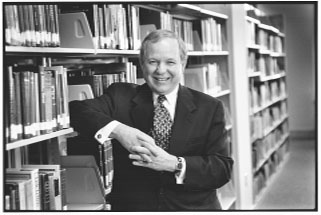An Alternative to Obsessive Individualism and Self-Focus
By Philip Eaton, President

"I believe that those who have invested in the discipline of renewing their minds are the ones who will make a difference in our churches, in our city, and in the world," says President Philip Eaton.
Much has been said in recent years about the loss of community in the modern world. Taking care not to idealize and therefore distort the past, nevertheless, we have lost a sense of the common good in our time. We have become extraordinarily self-focused. Perhaps the story of Babel is the most fitting metaphor to describe our way of living and working together. Somehow we are not singing off the same sheet of music, and the tune we sing is often lousy music.
The historical reasons for this are not hard to identify. Genuine community is a difficult reach for most Americans because of our longstanding and sometimes fierce defense of individualism and self-reliance. Let me "do it my way" has a resonant ring of truth for all of us. Ralph Waldo Emerson, one of the great voices in all of American literature and culture, both captured and shaped a culture where the self is the center of the universe. As Americans, we will pay a great price to keep from losing our individual freedom. "To do our own thing" is surely one of our highest aspirations.
Of course, Emerson emerged at a moment in time when the Judeo-Christian tradition began to lose its grip as the center of culture. As self-reliance became more deeply rooted, any notion of common authority that could define the common good became more and more remote. The great sweep of what we call "Western culture," influenced and shaped by the Judeo-Christian tradition and an essentially biblical worldview, was coming to an end. We live now in a radically pluralistic world, and deep-seated relativism is often the way we look at our life together. All authority is under question. "Who says?" most certainly reinforces an insistence upon "doing it my way."
The price we pay for such determined individualism is very high indeed. Loneliness is surely the dis-ease of our time. Downright meanness is too often the way we deal with one another. We have become obsessively litigious. Road rage is frighteningly common. One sociologist has written a very insightful and influential article about the growing phenomenon of "bowling alone." "As we watch the collapse of civility in America," says Stephen Carter, "everybody seems to be wondering why Americans treat each other so shabbily." But there is an alternative, a fundamentally different way of living together. In Romans 12, Paul strikes that clear note of difference: "do not think too highly of yourself"; "love one another with mutual affection; outdo one another in showing honor"; "live in harmony with one another." As we become "transformed by the renewing of our minds," Paul argues, we become a counter-cultural force to this obsessive individualism that causes so much grief among us.
The Christian way of life may now be historically sub-cultural, but to call ourselves a Christian community means we must carry ourselves with "uncommon decency," as Rich Mouw has written, seeking "Christian civility in an uncivil world." We must take a radically different approach to the common good. I believe we must lift up new notions of genuine community.
At Seattle Pacific University, we seek to model grace-filled community. I believe this is a deeply important commitment for us as we move into the future. We must be a place where our people come first, where we treat each other with kindness, civility, decency and love. We must be a place where we do our business without political manipulation. We must be a place where trust is a signature mark.
In addition, we need to be a place where people can fail and learn from their mistakes. Parker Palmer has said that "community is a continual act of forgiveness," and I believe we must find the courage to risk true forgiveness.
To be held together by a compelling common purpose is a radical notion in our time. To focus on the transforming power of Jesus Christ at the center of our learning enterprise, and to be exceedingly well-organized around that center -- this indeed is an exciting venture of newness for our culture. But is this not the requirement of living transformed lives?
The blueprint we receive from Jesus on how to build the kingdom of God includes working together in genuine, grace-filled community. And I believe one more thing: to seek to live and work in community is to shine a bright light of hope into our surrounding culture.
![]()

| Please read our
disclaimer.
Send any questions, comments or correspondence about Response to
jgilnett@spu.edu or call 206-281-2051. Copyright © 1999 University Communications,Seattle Pacific University.
Seattle Pacific University |